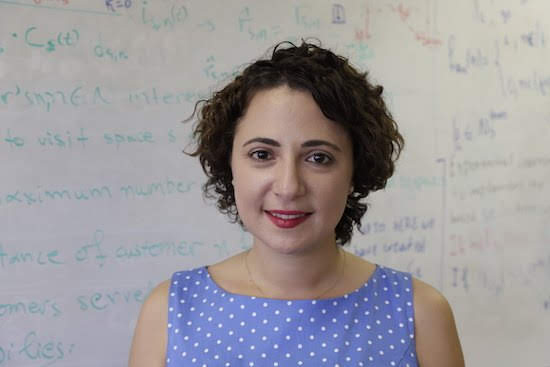Recent News
UNM Engineering Ph.D. candidate named ASCE ‘24 Outstanding Reviewer
August 11, 2025
UNM joins Brown University in national institute focused on intuitive, trustworthy AI assistants
August 6, 2025
UNM Engineering team wins ASEE best paper for work on first-year engineering course
July 17, 2025
New director will enhance interdisciplinary engineering learning opportunities
July 2, 2025
News Archives
ECE professor receives NSF grant to study novel ways to optimize 5G networks
July 15, 2019 - By Kim Delker

Eirini Eleni Tsiropoulou, an assistant professor in The University of New Mexico Department of Electrical and Computer Engineering, has received a grant from the National Science Foundation for a project that will explore new ways to ensure that emerging 5G systems interact optimally and efficiently with humans as well as other technology.
The project, called “CRII: NeTS: Real-life modeling for EFficient RESource management in Heterogeneous multi-user systems – REFRESH,” is for around $175,000 over two years.
5G network connections not only enhance cell phone connections and broadband access for mobile devices, but they enable technology such as augmented reality, industrial automation, smart cities and smart homes, self-driving cars, tactile Internet, and life-saving communications in natural disasters, among other uses.
In recent years, the technology has rapidly expanded in ways researchers may have never expected. In fact, the technology has grown so fast in the area of interconnected systems, while the science and technology to conceptualize and design for the deep interdependencies among user behaviors, interactions, and decisions has lagged behind, and with the projected expansion of 5G technologies in the coming years, this issue will become even more critical.
Tsiropoulou’s project will seek to formulate solutions in the form of a framework that will benefit both users (lower prices, reduced power consumption) as well as network or service providers (energy savings and satisfied customers). It also will make it possible to expand and exploit 5G technology through the creation of economies of scale.
The National Science Foundation (NSF) Computer and Information Science and Engineering (CISE) Research Initiation Initiative (CRII) Award is dedicated to encouraging research independence immediately upon obtaining one's first academic position after the receipt of the Ph.D. It is expected that NSF CRII funds will allow the new CISE Research Initiation Initiative principal investigator to establish research independence while supporting graduate students for up to two years.
Tsiropoulou said that the NSF CRII Award is a prestigious grant designed to support junior STEM faculty members to initiate the course of independent research and establish leadership in their respective fields, as only 55-60 awards are made per year in the United States.
“The NSF CRII grant will support my research to REFRESH the way resource management is performed in cyber-physical systems,” she said. “I would like to thank the NSF director and the anonymous reviewers that supported this novel idea, as well as my research group (PROTON Lab) consisting of brilliant graduate and undergraduate students that nothing could be possible without them.”
Tsiropoulou said she is eager to dive into further research on this emerging topic.
“With this award, I have a unique opportunity to shed more light on the ways of treating the critical problem of resource management in heterogeneous multi-user systems through a socio-technical perspective. In particular, we aim to introduce and validate a user-centric resource orchestration framework while accounting for the user risk-seeking or loss-aversion behavior under uncertainty, typically observed in emerging 5G and cyber-physical social systems.”
Broader impacts of the project include educational activities, outreach actions, minority student recruitment, diversity, and data dissemination.

